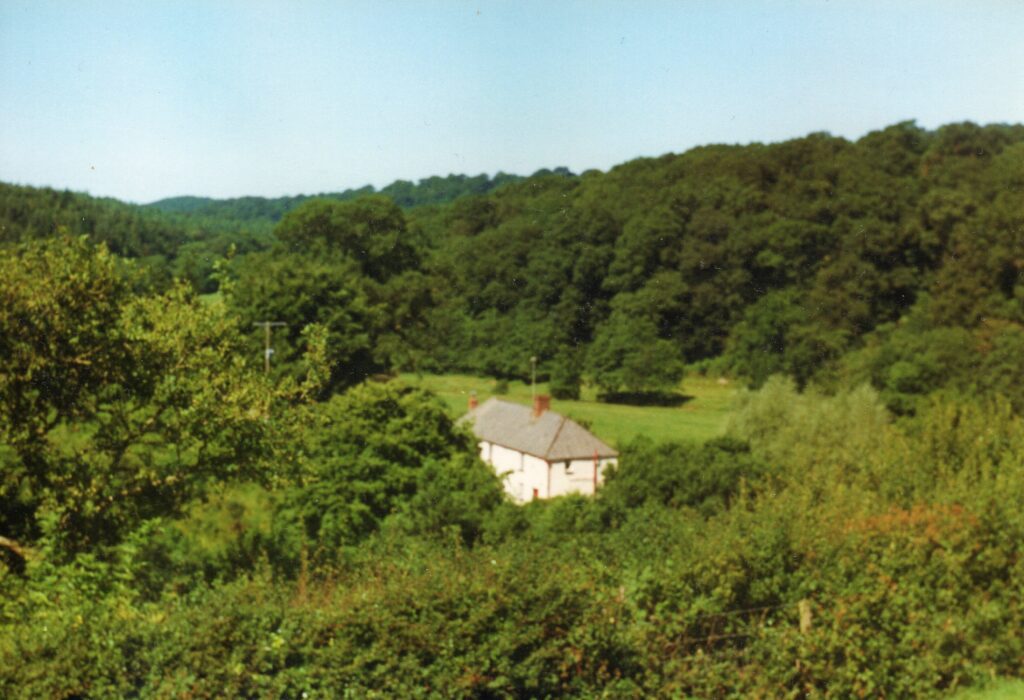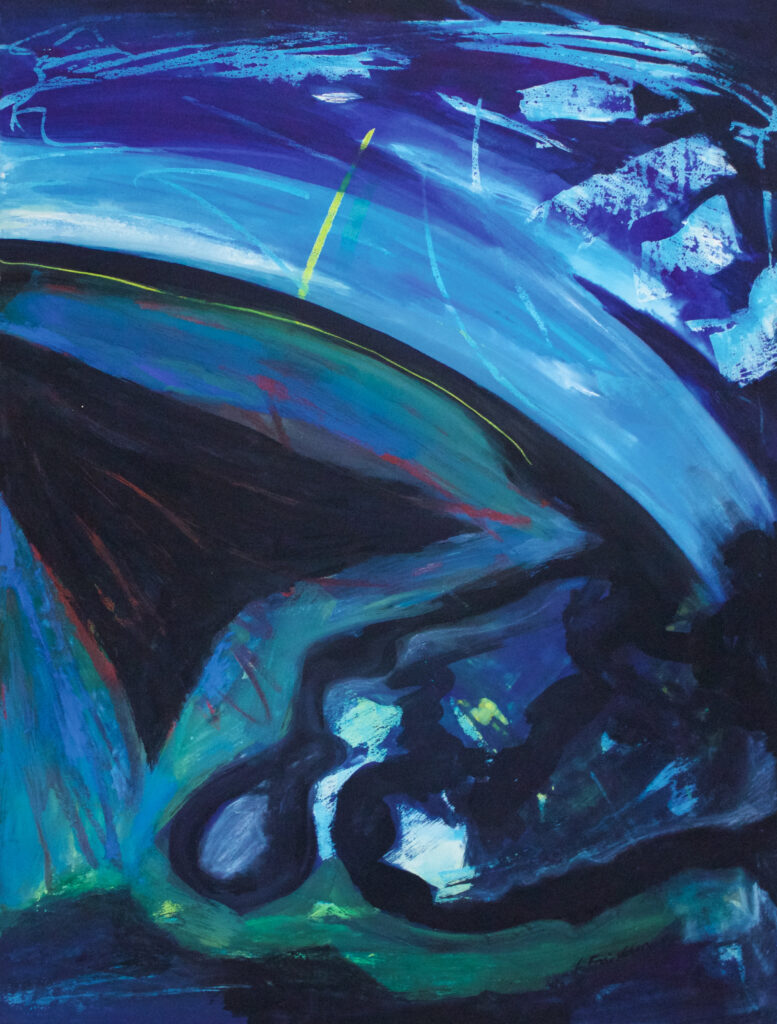A Love Letter to Hest Bank – the beautiful and the inconsequential
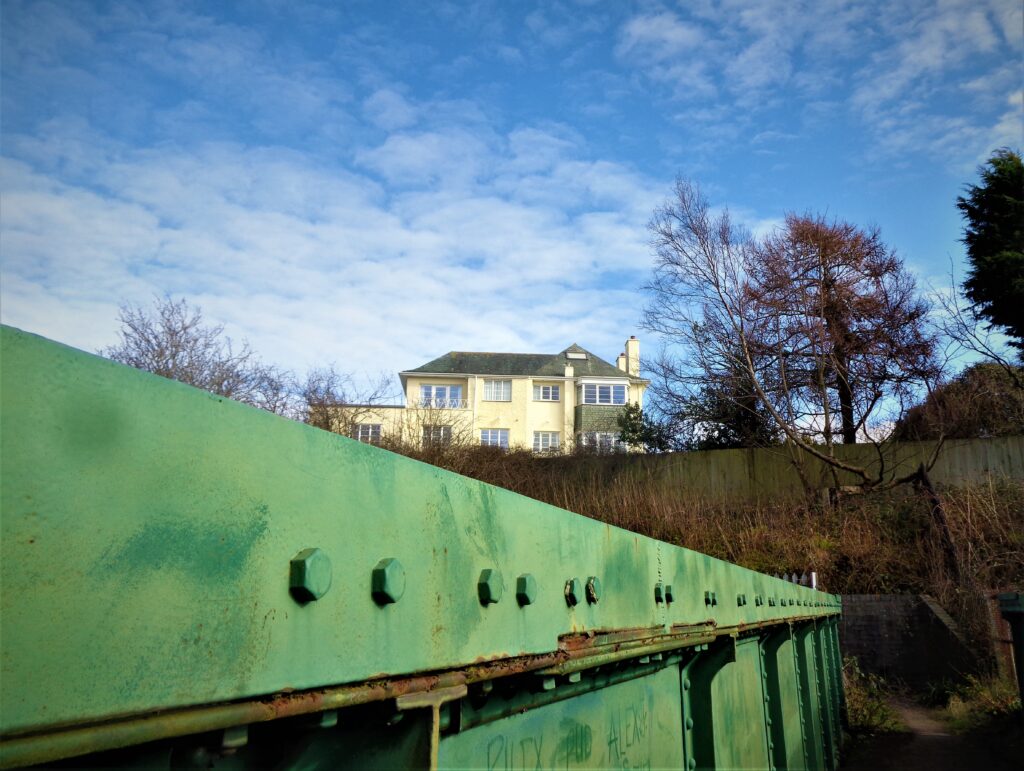
Hest Bank, footbridge over the WCML[i], 25th February 2022
These days, thanks to a Quixotic, otherworldly ambition and my increasing grievances against the myriad ways in which the so-called real world falls short (understatement[ii]), lying in bed is not something I can afford to risk. Get up and get moving at all costs. Naturally the weather is almost always against us: sunny when we want to concentrate on an interior world, raining when we’d rather be away. But this has to be ignored: forecasts rarely stay correct, and the texture of a day is more complex than mere weather.
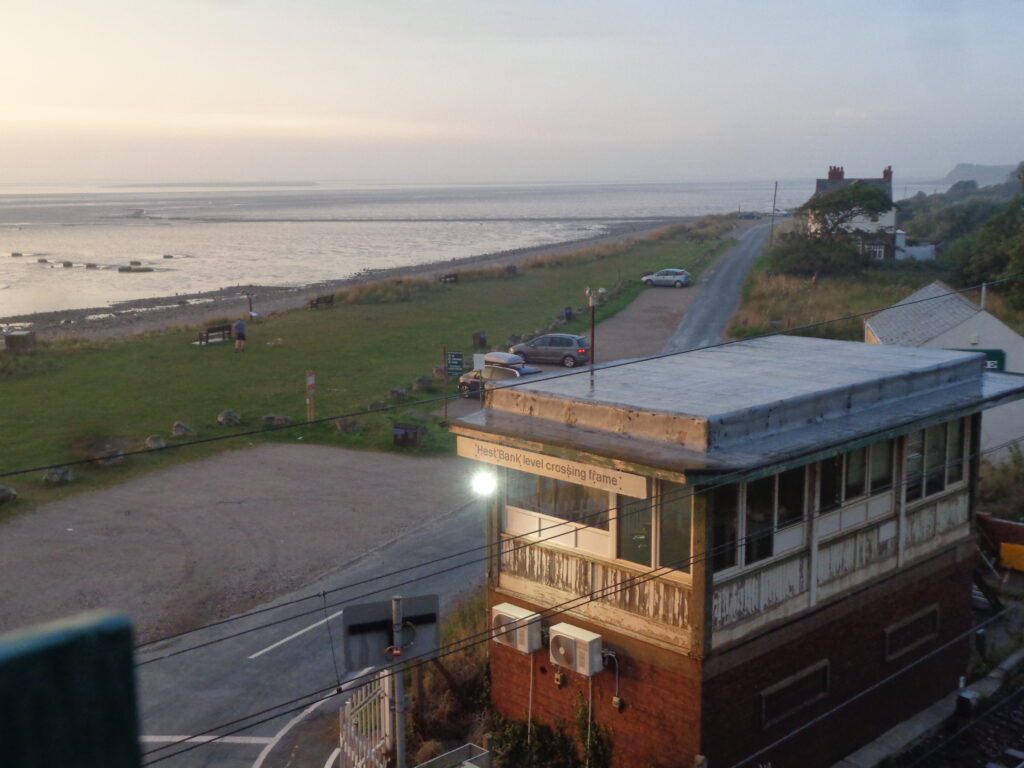
Sadly, Hest Bank’s post-war Signal box is not a listed structure and is being left to rot, 9th Sept 2021
Hest Bank[iii], a minor but distinctive semi-suburb just to the north of Morecambe and Heysham, lost one of its original reasons for existing back in 1969[iv] when along with that at Bolton-le-Sands[v], its railway station (a junction for Morecambe) was closed and subsequently demolished before the West Coast Main Line’s electrification in 1973. From 1960 to 1969 there were camping coaches[vi] at Hest Bank available to rent between the main line and the beach[vii]. When the goods yard closed at the end of 1963, the camping coaches used its old tracks.
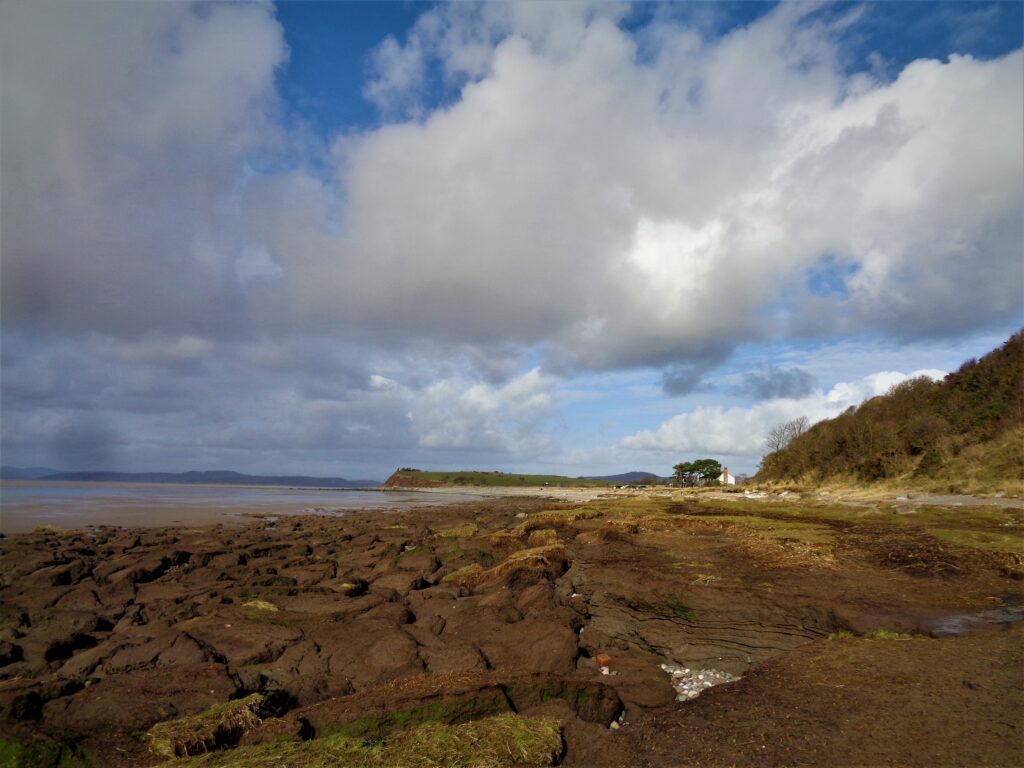
Hest Bank coast looking north, 25th February 2022
The only place where the West Coast Main Line actually touches the shore of Britain’s west coast[viii], northbound steam-hauled expresses and freights would be running fast here, either to counter the bank from which I’d assumed the place took its name, or to scoop water from the troughs[ix] just north of the level crossing. But perhaps Hest Bank was named after the natural rise in the land? So far I’ve found no conclusive information nor a gradient profile for the railway.
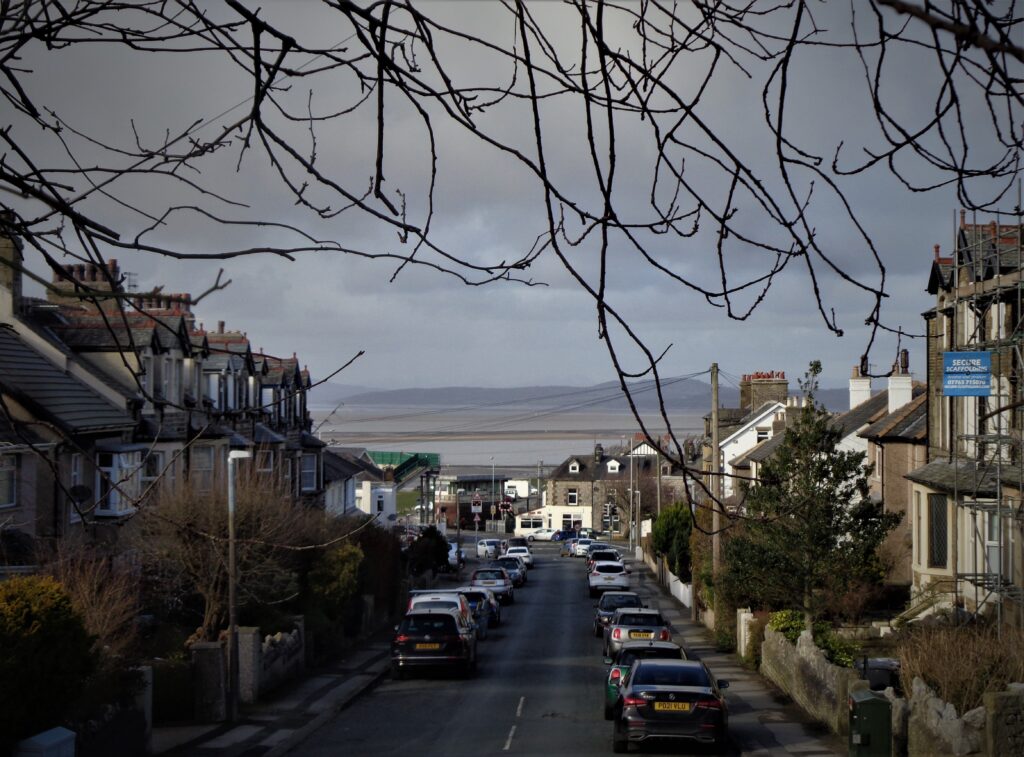
Station Road, Hest Bank – the hill from the canal down to the level crossing, 25th February 2022, Arnside Knot visible across Morecambe Bay
Whatever the origin of its name, before the railway opened in 1846, Hest Bank was only a scatter of buildings and farms[x]. As usual, the canal had arrived earlier, its now severed[xi] extension to Kendal being completed in 1819[xii]. Using the contours of the land, the Lancaster canal follows what has come to seem a natural terrace above most of the village. In the 41 miles north from Preston to the derelict Tewitfield staircase[xiii], there are no other locks – the longest section of level canal anywhere in the country. Such information may be inconsequential to all but the languid boater. More significant is the difference trees make in summer, concealing the wider views of winter to cloak the water’s route in another version of beauty.
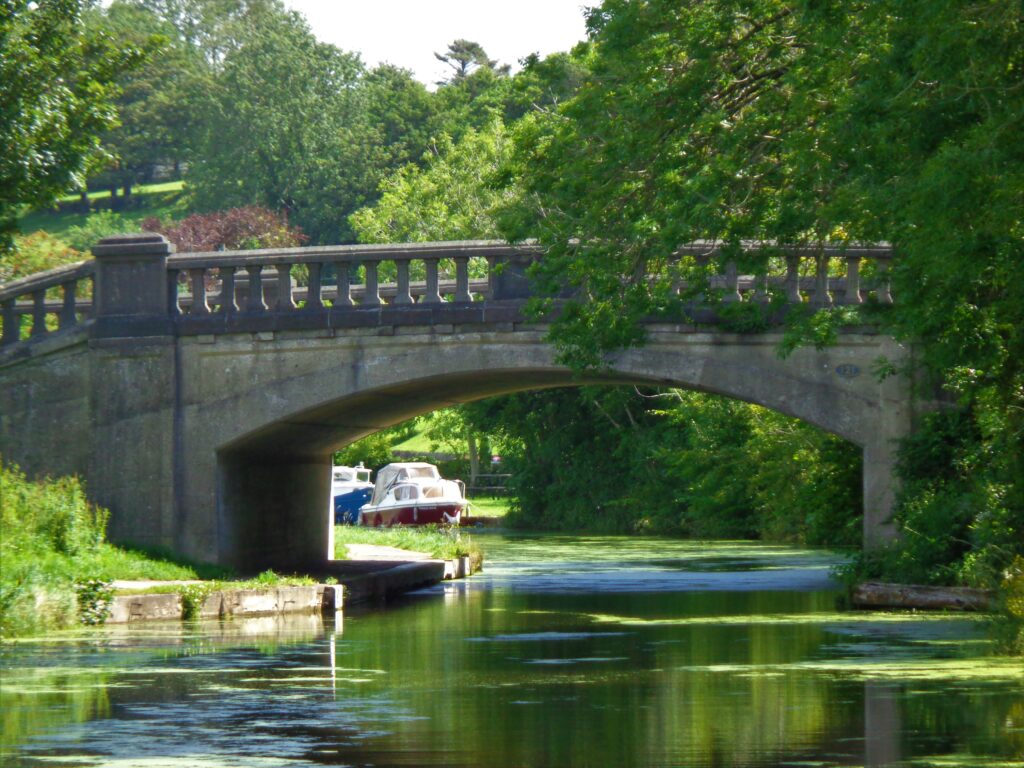
19th July 2020 – Hest Bank canalside on that summer trip with my daughter
But all I have to give
Are my dreams . . . of coming and going forever
Inside the rivers of time[xiv]
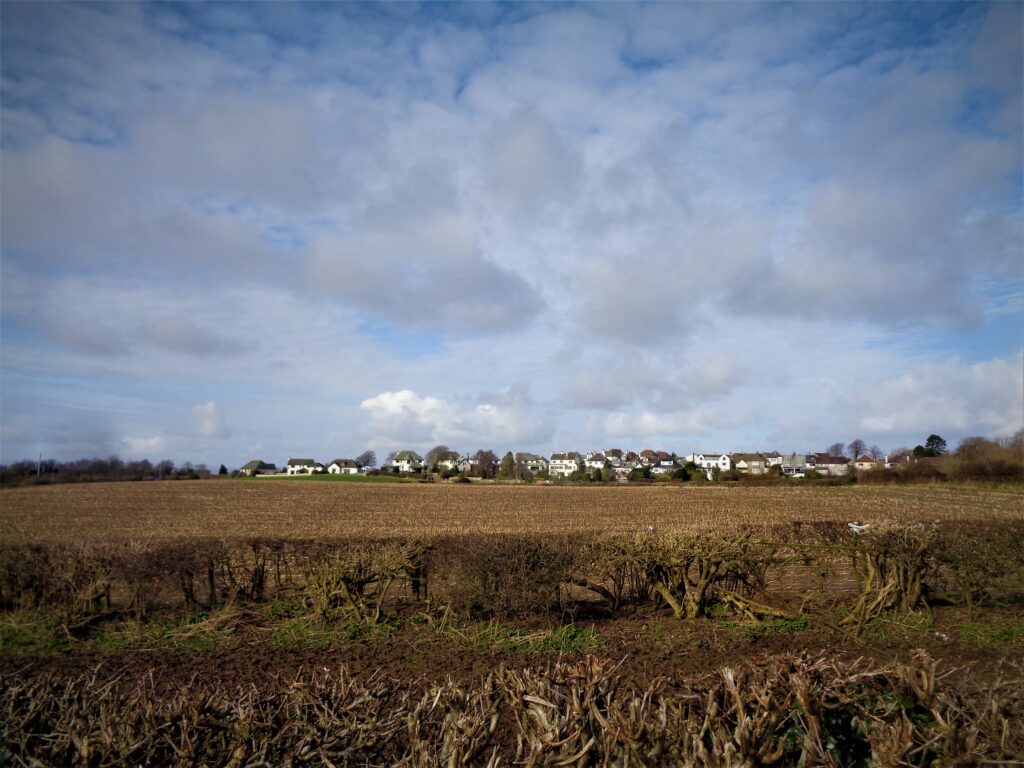
Hest Bank from afar, 26th February 2022
Back in February, seen from half a mile inland, close to the Lancaster canal as it heads towards the coast, I fell in love with Hest Bank all over again, maybe because it somehow reminded (remound) me of Sunday cycles as a teenager – dreading the homework I should have done and knew I wouldn’t . . . before dismissing all such hogwash to be free in the sun, rain, or frost. The Aylesbury arm of the Grand Union, or Wendover’s still more disused, reed-blown stub, must have been ruffling in the back of my mind. Perhaps to decrease any sense of contemporary loneliness[xv] (personal or metaphysical), Hest Bank seen over the fields, took me back 45 years.
In those days almost nothing was open on Sundays, and the lanes and fields (not to mention lunchtime pub gardens from 12 to 2 if we could bluff ourselves older) were mine or ours alone.
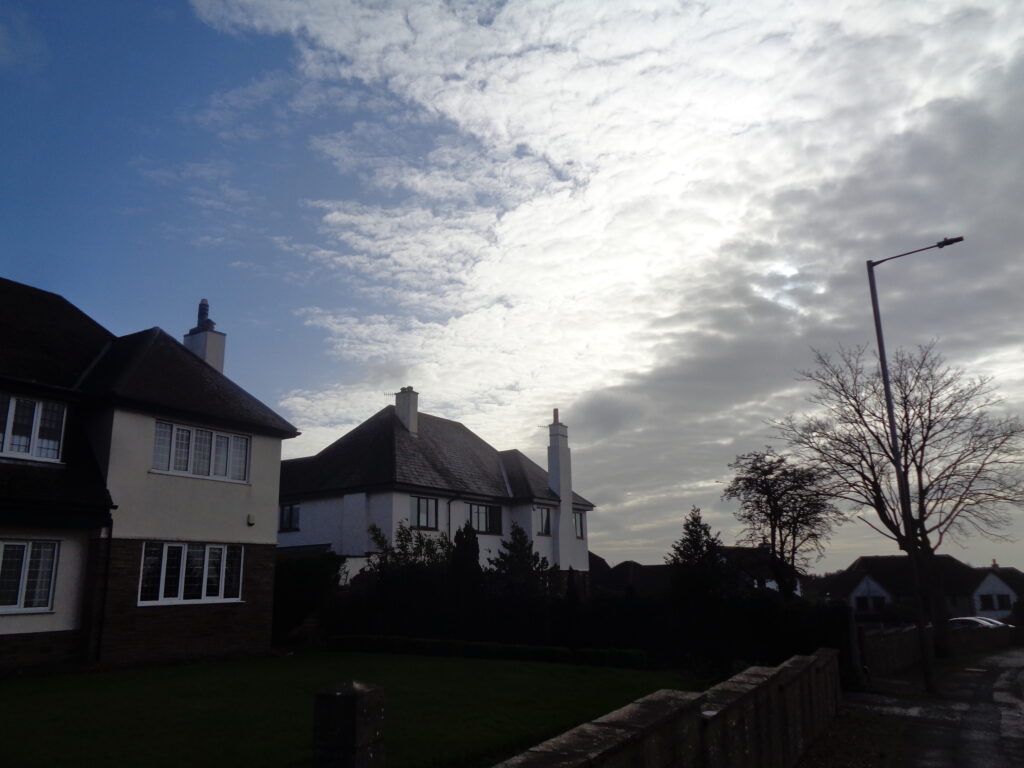
Hest Bank mansions, 25th February 2022
Compared to Morecambe, Hest Bank is expensive and relatively posh. Large mansions impose their withdrawn remoteness and even normal semis have a detached air. Litter and the leavings of dogs, rarely mar the pavements, yet across the level crossing, there are small areas of close-packed mobile homes, descendants of the camping coaches of yesteryore, looking dangerously vulnerable to high tides and the forthcoming rise in sea level. Some predict that this could be as much as 25 metres in the next 50 years – in which event most of my Kingdom by the Sea will disappear. Only the highest houses in Hest Bank might survive and the top floors of tower blocks back in town. The hopefully long decommissioned nuclear power stations will be disastrously submerged leaving Heysham Head as an offshore island. Anyone left will have to retreat to Warton Crag or the moors known as the Forest of Bowland[xvi].
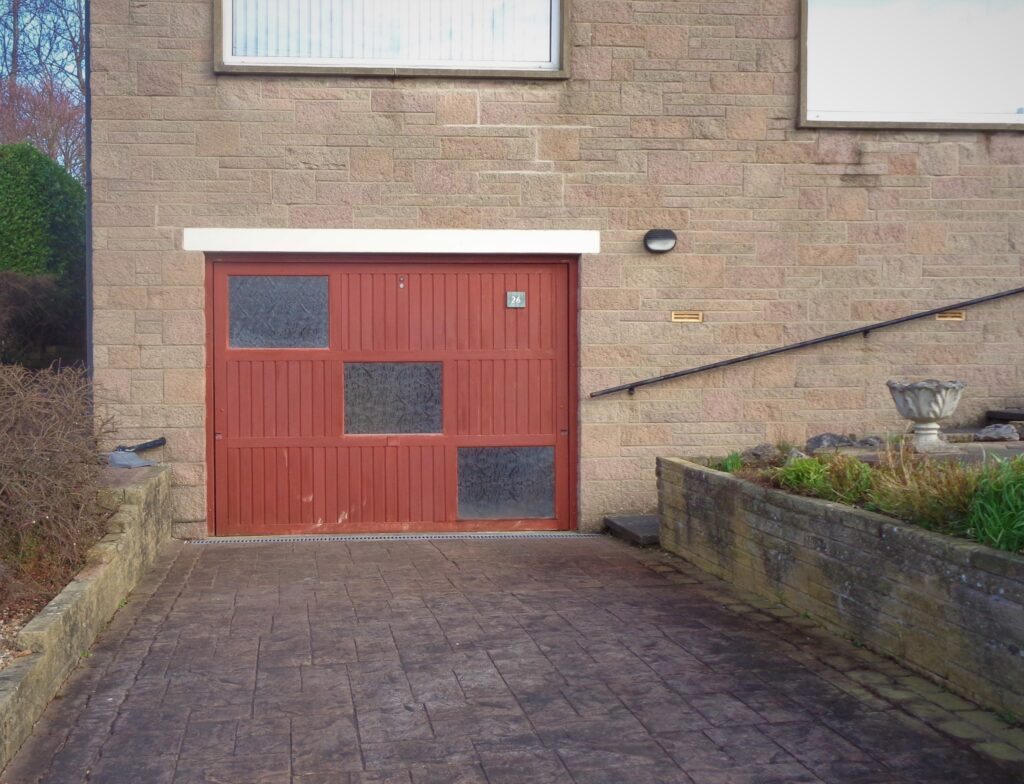
26th February 2022. Will the tide be washing into this garage in 30 years’ time?
All these pleasing visions of nature’s revenge shouldn’t prevent my writing a love letter to Hest Bank, but on second thoughts I know I’m being self-indulgent, expansive, overly sentimental. How can Hest Bank care about me, or any of us? It’s only a place. Some of my best friends may be places but in truth they remain aloof. As with almost everything, their magic is partly a reflection of us, our desires and perceptions, our memories and those of the people we may briefly encounter – those passing conversations and felicities: a pot of tea in Hest Bank’s Shore Café; the glimmers of light from a pearly sky; the rush of the trains which can still be atmospheric – the occasional thudding freight at least. Generally, these days, trains whine rather than thunder. No more do they wreathe us in dragons steam or smoke – that long spiralling trail, black and white, left behind up the bank.
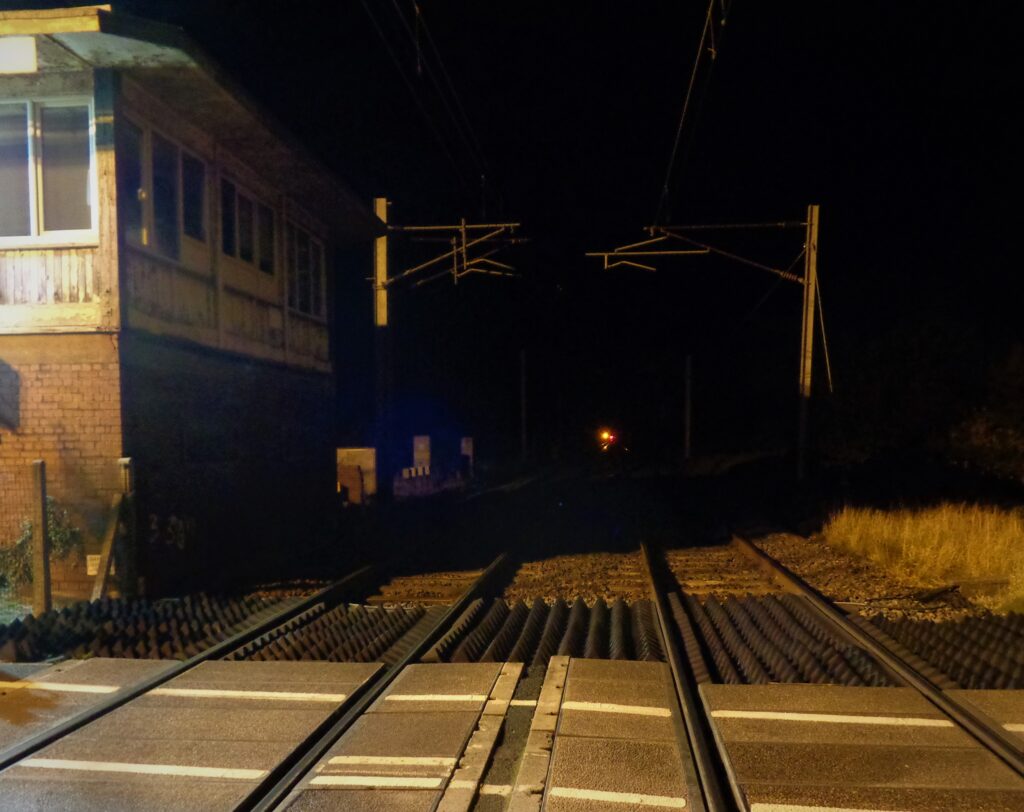
At one time there were water troughs just north of here. Hest Bank, 29th October 2021
Other than putting a pair of sunglasses over the lens for a cheap 70s effect, I’ve rarely cropped and never otherwise tampered with photos before this digression[xvii], but my lucky dip camera (a cheap gadget without a viewfinder and which has now lost its screen) has necessitated regular cropping and in the process I discovered other balances and exaggerations, most of which add nothing and tend to destroy the original spirit. Some, while hardly creative (‘get creative’ the computer urges), can be amusing though. Apparently a camera is now being advertised with a feature that removes all unwanted people[xviii]. Personally, I would rather have one that removed post 1990 cars[xix] – yet always reassure myself that at some point in the near future there will be no cars and their appearance will become a novelty. Here begins a more focussed version of my long-established internal philosophy of cheerful misanthropy!
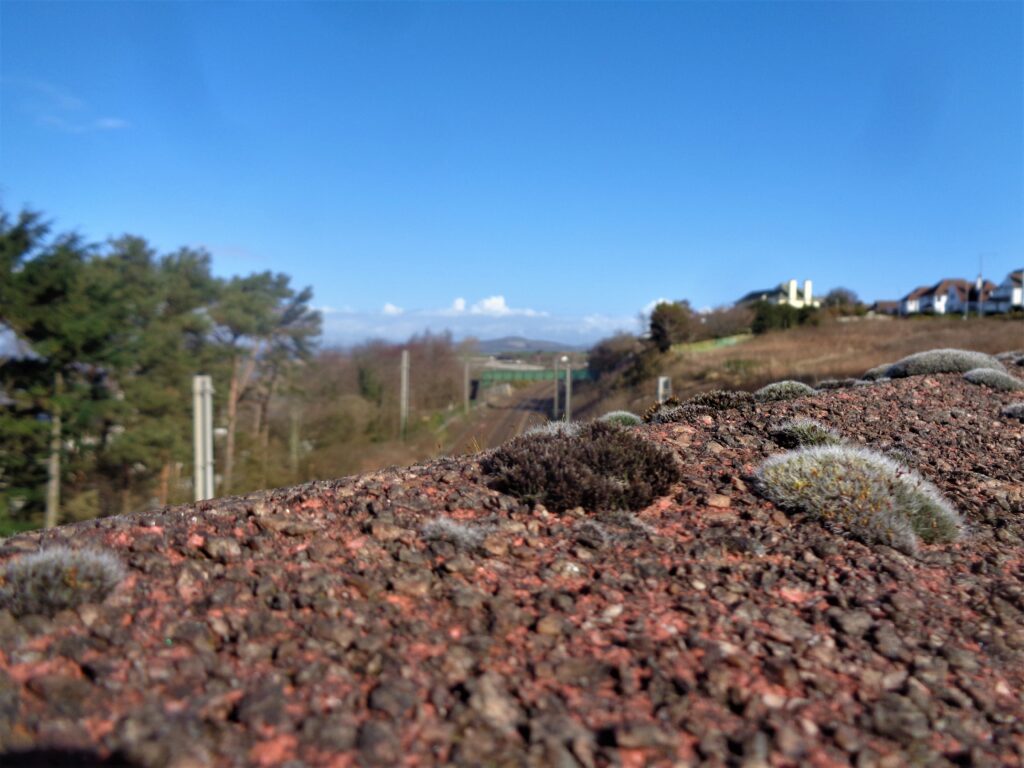
Hest Bank seen almost geologically, from the A5105[xx] road bridge over the WCML, 14th March 2022
In the middle of last night, the insomniac of Bombed Out[xxi] was at it again and I picked up Ted Hughes’ Birthday Letters[xxii]. This was one of my mum’s books, left behind when she died almost a decade ago. Only in the last few months have I got around to reading it – vitally in tandem with another book which may also have been hers: Erica Wagner’s Ariel’s Gift[xxiii].
Birthday Letters contains some of the finest poems I’ve read yet also some of the more personal and seemingly inconsequential – an unevenness not surprising considering the possible origin of the long sequence as self-therapy not intended for publication. Once inevitably published (how lucky to have that guaranteed interest!), its coherence and narrative remains heavily reliant on the Hughes/Plath tragedy. I had not realised how relatively successful (externally) they were even before their ill-fated move to Devon . . . that dreadful Error[xxiv] as Hughes titles the poem which devastated yet fired me in the tides of night.
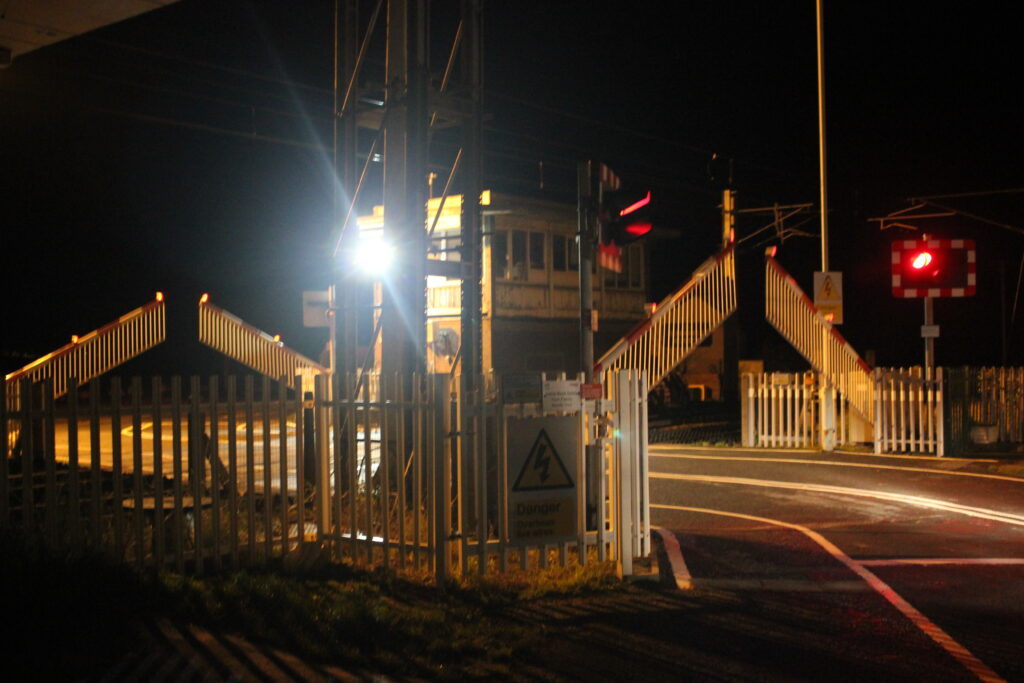
High tide beyond the crossing gates . . . Autumn 2021
Inexorably, part of the unsettling power – richly analysed by Ariel’s Gift – of both Error[xxv] and The Pan[xxvi], is owed to the celebrity of both narrator and muse. The events of Hughes’ and Plath’s life are well-enough known for almost everyone, with or without any kind of belief in the essential nature of art and literature, to have an opinion. There have been real academics, critics and fans of Hughes and Plath whose devotional challenge, prejudice, and partisanship (like the attitudes fictionally showcased in the recent TV series of Stephen King’s Lisey’s Story[xxvii]) verge on the unhinged. Personally, though my sympathies were more with Plath, I’ve tried not to take sides in the Hughes versus Plath tournament[xxviii]. Who can say what exactly went on behind the scenes?
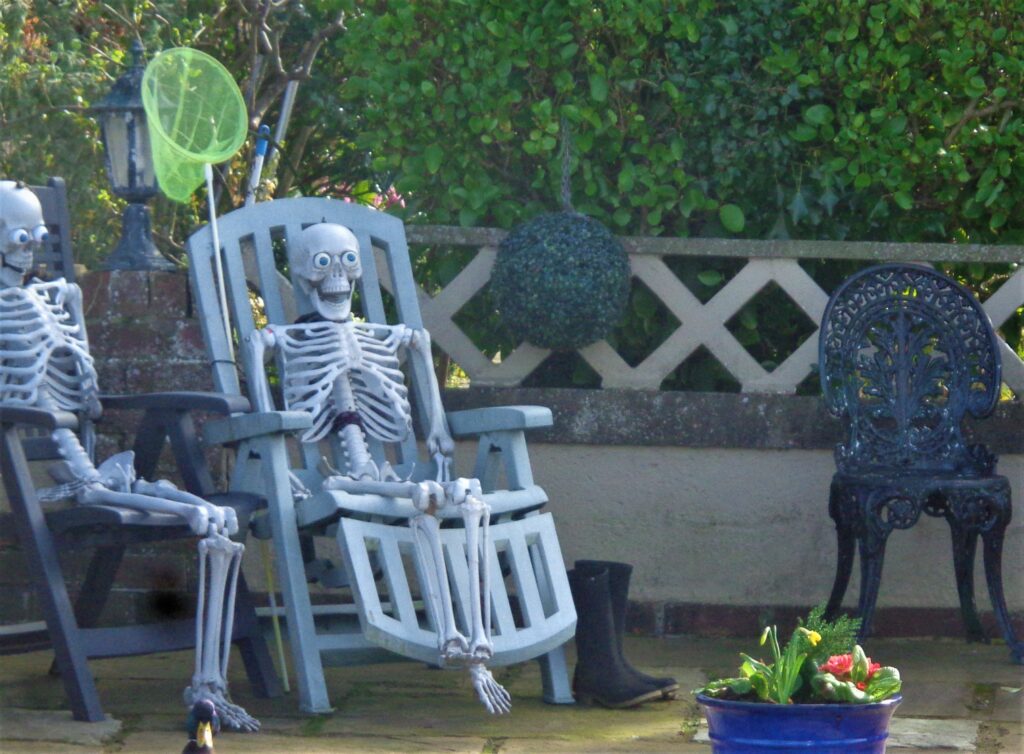
“Light the touchpaper Putin” . . . [xxix] Canalside anticipant’s of World War 3, Hest Bank, March 2022
I was drawn to early Hughes as a teenager and most of Plath a little later, but until the best of Birthday Letters (and re-encountering the more concise Plath poems which Birthday Letters occasionally interrogates, riffs upon, or deconstructs) I had grown tired, even cynical about both of them. I didn’t entirely swallow the “cruel Ted” line, and tending to avoid gossip, have only recently encountered all the well-documented womanising. I also didn’t try to guess too hard at their joint love/psychosis from within. Instead, I ended up irritated, ready to accept the superficial conclusion of a couple who could have had everything . . . but blew it.
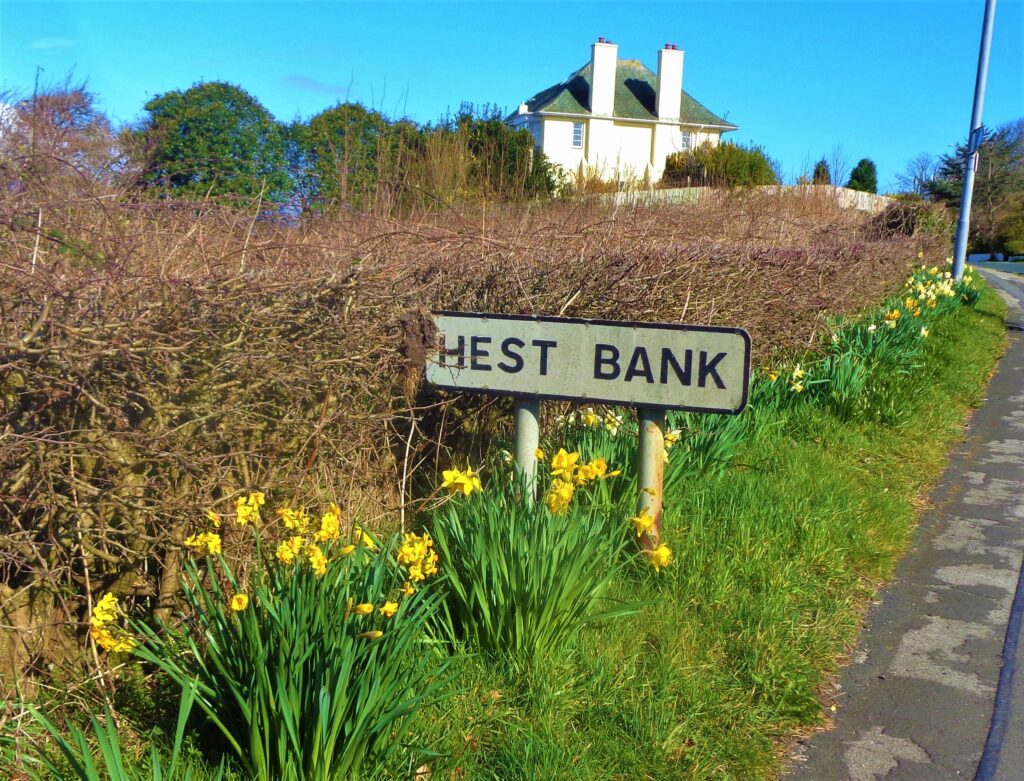
The daffodils / Were incidental gilding of the deeds / Treasure trove. They simply came . . .[xxx]
Time and place and the keys to the overlap: the distant view of Hest Bank over the fields inescapably connecting me to Buckinghamshire 45 years earlier. The daffodils by the roadside above, connecting to North Devon – where both primrose and daffodils are so profuse. As with Hughes’s vicarage at North Tawton, so our garden at Little Witheridge and all the lanesides threading away, were simply filled with them.
To see our friendly kitchen again,
feel the lostness in time of inland North Devon[xxxi]
at the century’s last turn
Your paler hand over mine, a tentative smile
the birthday party’s question
It would be easy just to dream the leagues of fields and woods around
to sigh without engaging
But it’s too late now
All these past moments burn without consummation
You must go through the tunnel[xxxii]
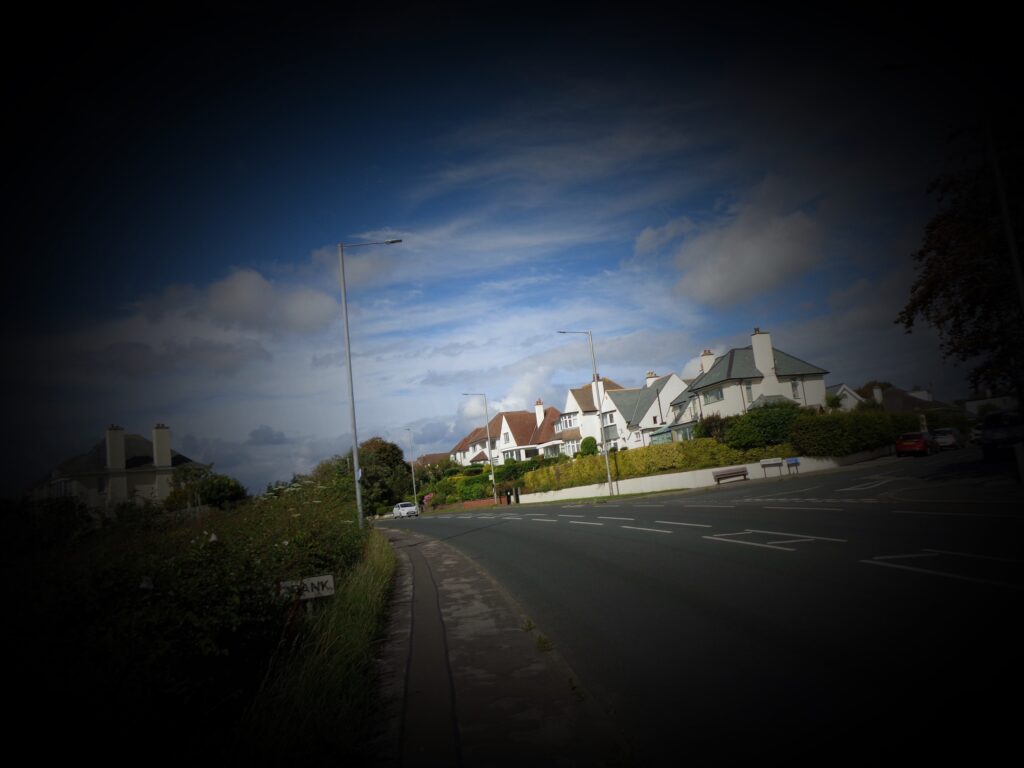
Hest Bank-le-Rubicon, 19th July 2020
The best of Birthday Letters (and its easy to forget or disregard all that isn’t) feels as though the characters of some disconcerting but favourite, etched-in-the-brain novel, are coming to life. Although the finest of the poems would work without the tabloid backstory of controversy and still-greater-in-retrospect literary fame, it’s interesting to wonder how enamoured newspapers, critics and the general public would have been by Birthday Letters without the negative glamour cast by Sylvia and Ted[xxxiii]. Early death and suicide – accidental or not[xxxiv] – carry a heavy depth charge. How else would a feature film with James 007 Bond[xxxv] as Hughes (!) and Gwyneth Paltrow as Plath[xxxvi] stand any chance of success?[xxxvii]
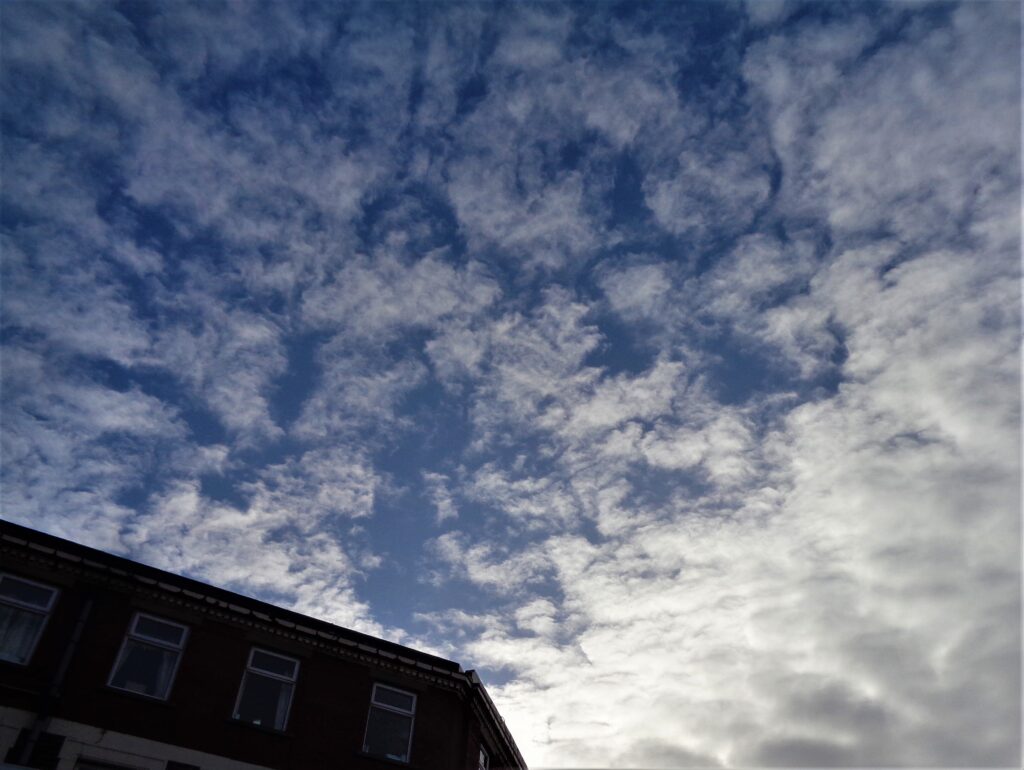
Royal Road sky, returning from Hest Bank, 25th February 2022
Going back to The Pan and Error, even more than the Plath/Hughes legend, the cause of these two poems’ unsettling power comes via the insidious whisper and breath of a landscape so precisely and evocatively described by Yorkshire-born Hughes . . . yet also insistently twisted . . . as if, aware of his own sleepwalking morbidity, Hughes tries retrospectively to see the place through the eyes of his terminally isolated and habitually necrophiliac wife[xxxviii]. Undoubtably it’s easy for me to respond to this concise landscape ambience owing to my own intimate connection with North Devon – both the specific area and other parts of a county in which I lived for more than half my adult life. I feel its inland and coast, its moors and high-hedged lanes between steep fields, in my exiled bones. Maybe, despite my increasing sense of homelessness, of detachment from the idea of home altogether except as a concept inside the mind, North Devon particularly, is my heart’s home? Although the initial move, 200 miles west, could appear random, North Devon became my first landscape actively chosen. Entirely disconnected from where I grew up, how inscrutable in the end remain the gathering of reasons which led that way? How much subconscious desire is it easy to disguise or mislay behind the pragmatic and the fateful?[xxxix].
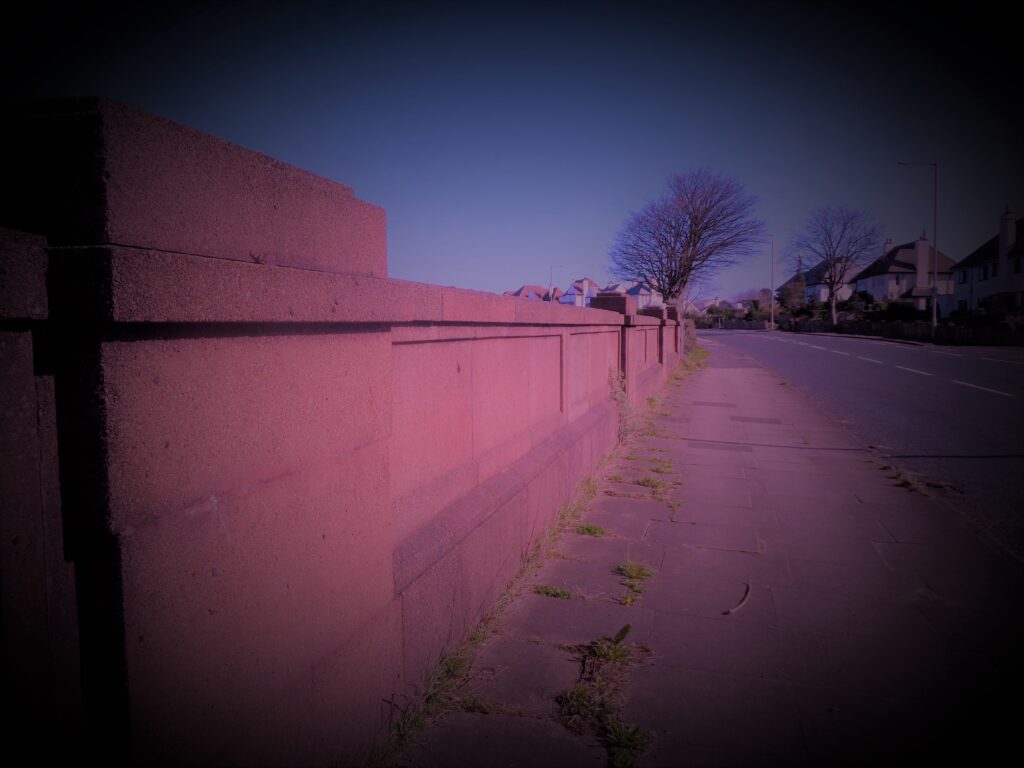
Rouged into memory: Hest Bank railway bridge, 14th March 2022
The first period I spent in Devon ran from the summer of 1980 to the summer of 1981. This was 18 years after Hughes and Plath moved there. In 1980, the North Devon link road was still eight years in the future, the caravan I lived in[xl] far more remote than the large village of North Tawton 20 miles to the south. The world had barely changed[xli]. The descriptions in Error become another time tunnel for me. But as with Glasby’s unfriendly Morecambrians in The Weird Shadow over Morecambe[xlii] so I recognise but don’t recognise, the fear and isolation Hughes perceives for Plath in Error – fear for the landscape and the people. Their house is Aimed at a graveyard, and: Under drumming thatch, we lay listening / To our vicarage rotting like a coffin[xliii]. To me that world was also daunting at first and the temporary jobs I did, verged on the medieval. But despite not only my name’s apparent foreignness, the people, once you could fathom their accent, generally became very friendly. The world I inhabited then, the ‘Country of the Two Rivers’[xliv], was and is perfectly captured in the photographs and socially historical text of The Heart of the Country[xlv] by James and Robin Ravilious.
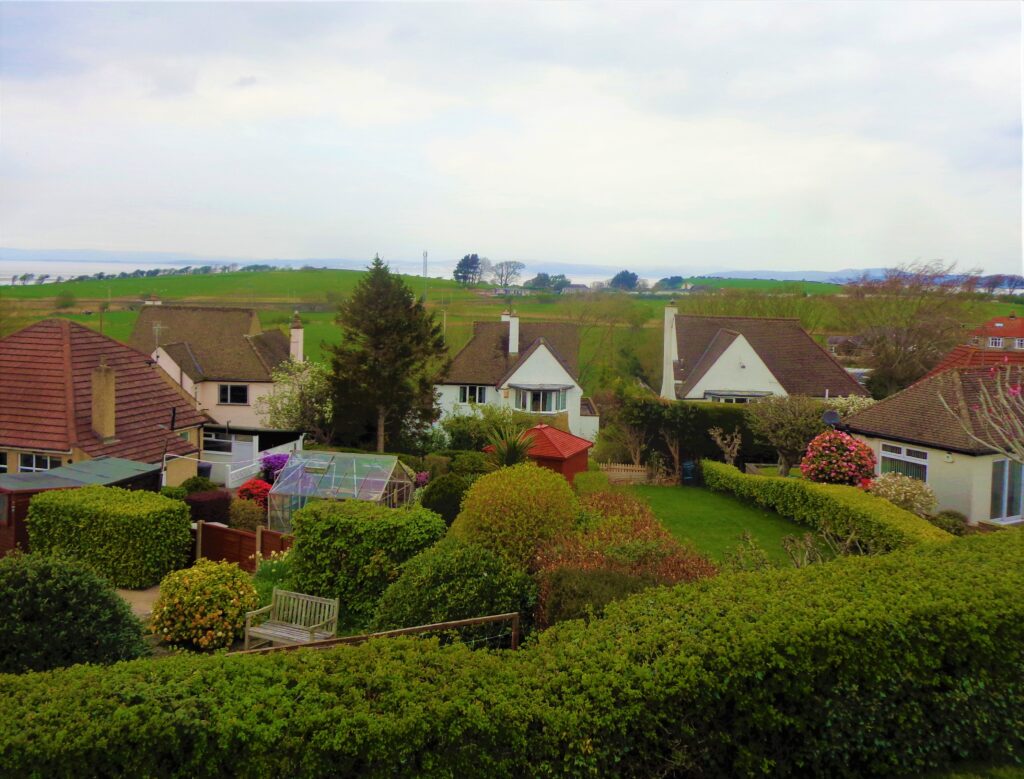
Hest Bank gardens from the canal, 15th April 2022
When in 1995, K and I moved back to live with our young family in the rented house of Little Witheridge, only 11 miles from North Tawton, the immediate world still wasn’t so different[xlvi]. The crucial difference between our and Plath’s experience was that we loved it straight away, unequivocally. To quote part two of this digression, the house felt haunted in a beneficent way – by some abstract genius loci perhaps? No egoistic personality – merely the landscape focussed. Always welcoming, the degree to which the house named Little Witheridge appeared – at least to me – bereft by our departure[xlvii] fourteen years later, still powerfully inhabits me.
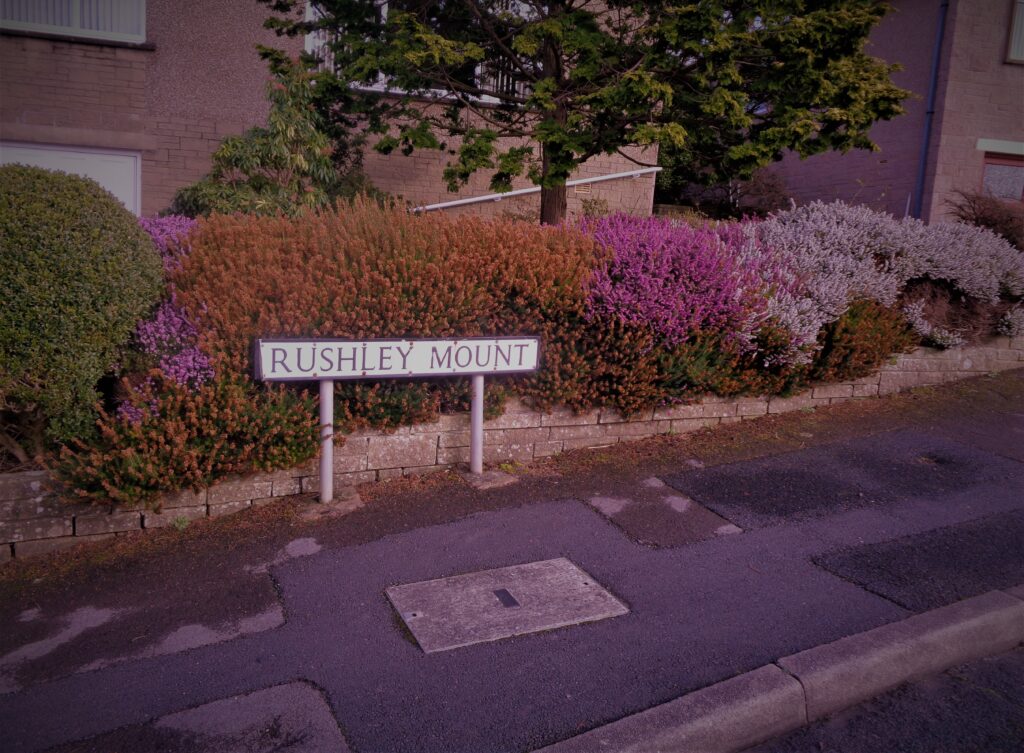
Hest Bank suburbia, 26th February 2022
That Hest Bank has a Buckinghamshire equivalent in my mind probably has no relevance to anyone else, yet such incommunicable inconsequentiality may strike at a truer meaning of beauty – a more fundamental and inspiring angle than flawless perfection or heritage grandeur[xlviii]. As globalisation must be made to coexist with decentralisation, so a serious, searching culture, commonly held, must not be allowed to bulldoze more personal perspectives. It is always important for each individual mind to create its own beauty rather than be imprisoned by another’s standards[xlix]. The origin of each person’s own fascinations will likely remain enigmatic, as will the sense of what might have been – those parallel lives bypassed.
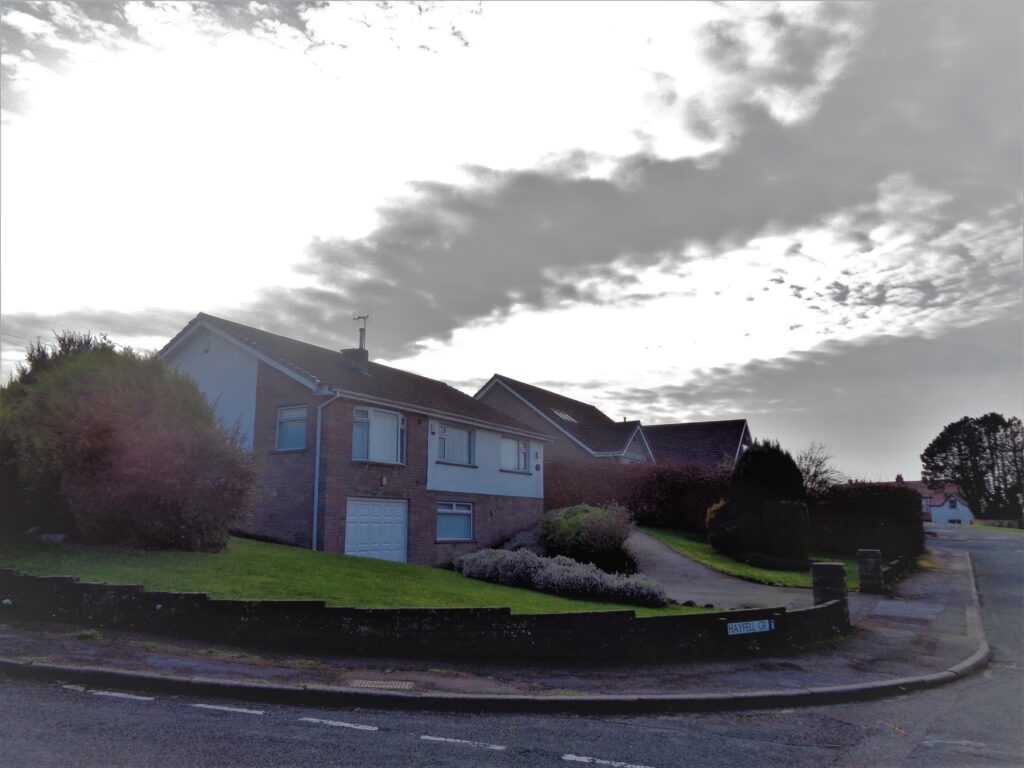
The pearly twilight of the afternoon emphasised my exile in a good way. Seaside suburbia again, Hest Bank, 25th February 2022
How different it would’ve been for our children to grow up in Hest Bank or Bucks rather than lost in the backwoods of Devon. Though North Bucks on a Sunday cycle could feel remote, for me London was only an hour away. Perhaps I was lucky to have such an easily available contrast. It’s common for all of us to feel that we missed out on something. My children often wished for a city, whereas I wished for Dartmoor. The social and landscape strata Hughes uses so precisely in Birthday Letters, that sense of gloom and isolation he more than suspects Plath was boxed in by, was definitely still there in 1980 and even in 1995, but my temperament generally bypassed it. We knew North Tawton well, but never tried knocking on his door. He might have been cheerful or dour, but we respected his loamy cell[l]. A cell perhaps formed of purgatorial self-punishment . . .
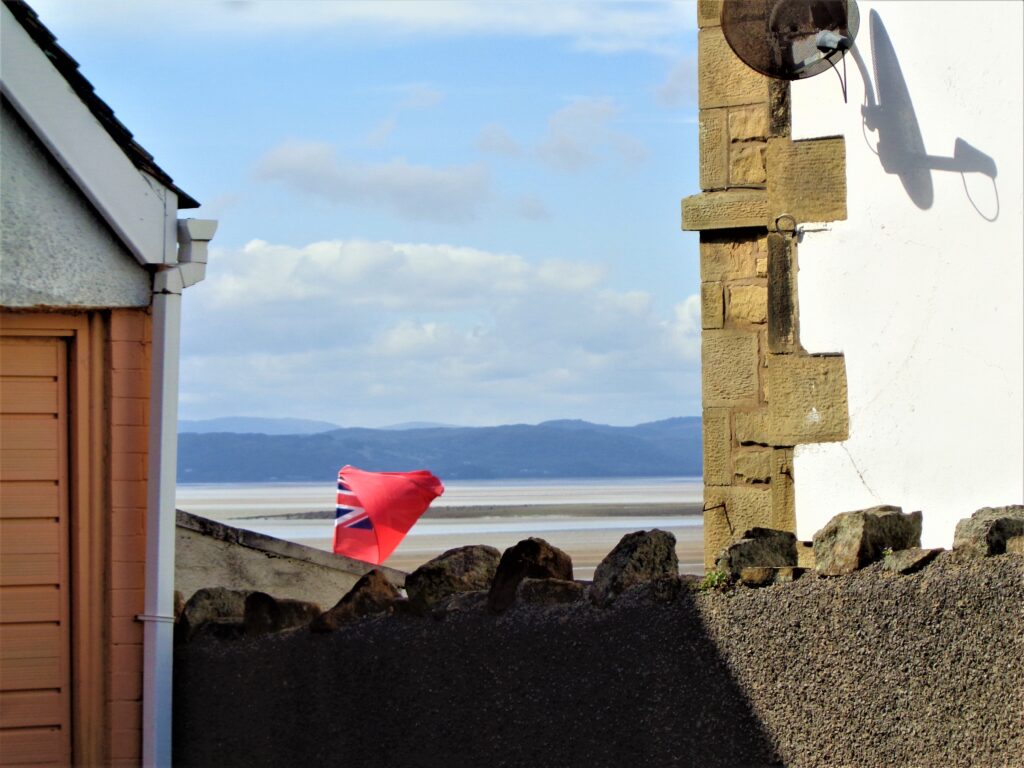
Gap towards Morecambe Bay, Hest Bank, July 2020
Winding coastward or inward, my other song, if I could sing, will always be to inexpressible inconsequentiality. Inconsequentiality that is anything but. To twilight junctions and road corners; houses that seem to breathe air from another time or place; night windows or Christmas porches. The way the streets change in Morecambe and Heysham from grotty to posh and back again in fifty yards. Not to forget those glimpses of the sea to the mountains on the far side of the bay which can either be bleak and intimidating, optimistic or expanding.
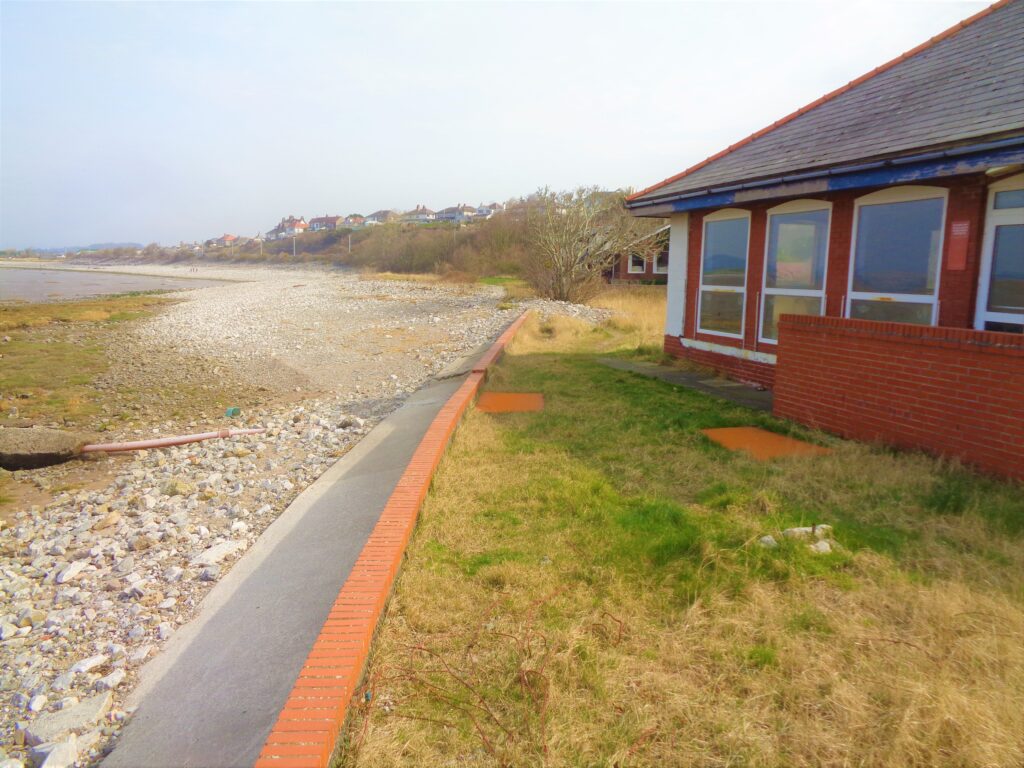
Hest Bank seen from Jo-N-Lees Café, 22nd March 2022
On another occasion, drifting back towards Morecambe, the light became muted, the sun suffused behind cloud, an atmosphere of almost sublime inconsequentiality descended. Even the dormant swimming pool visible from the utilitarian, concrete flagstone terrace of Jo-N-Lees Café took on a weird significance, a Greek temple inverse, a calm, anti-classical blandness . . .
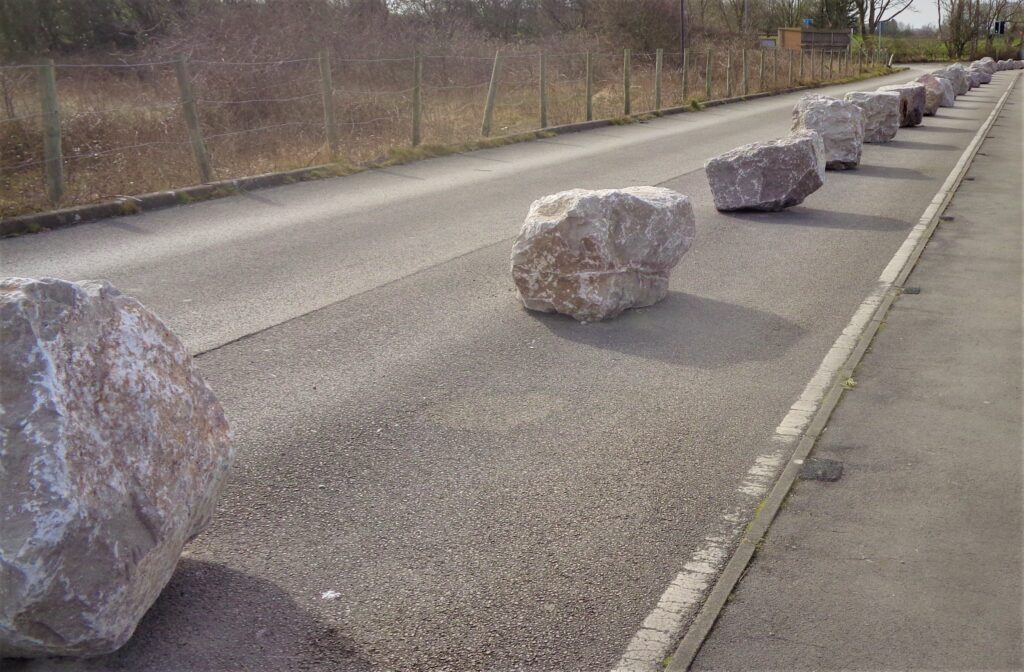
Avenue of megaliths between Hest Bank and Morecambe, March 2022
After the avenue of rock blockers that appear to have escaped from the beach and to be slowly marching somewhere, the distance to Happy Mount Park seems short or long depending on the wind direction. There, despite the subliminal warmth, early in the season, no crowds thronged, and the ride-on train was closed. Eager the dog-engine waited with surprising patience, eyes averted. There was a scent of pine and the softness of needles underfoot . . .
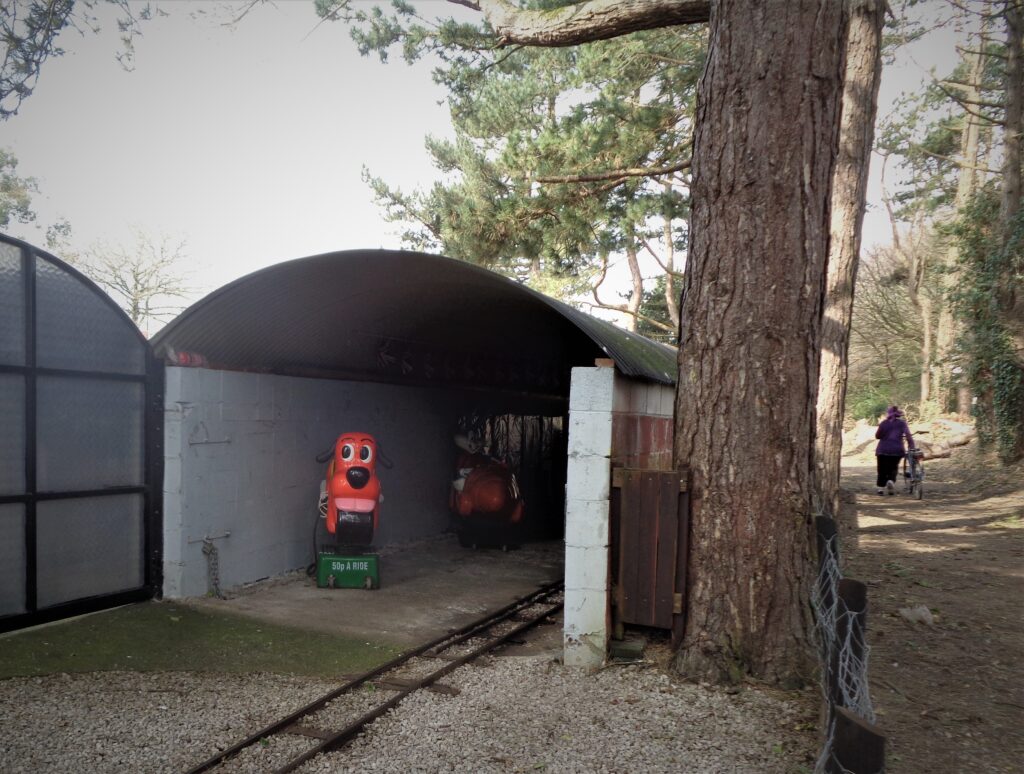
Happy Mount Park – Eager the dog-engine in his kennel, 22nd March 2022
It being better to end on beauty rather than inconsequentiality, naturally that cycle with Celeste of July 2020 comes back to mind[li]. Dismissing any sense of a faithless future, summoning the positive rather than the resignation of those two cheerfully fatalistic doom-monger skeletons seated by the canal anticipating WW III (Why do we always end up with such looneys in power? The list just goes on and on), I will return to the summer canalside.
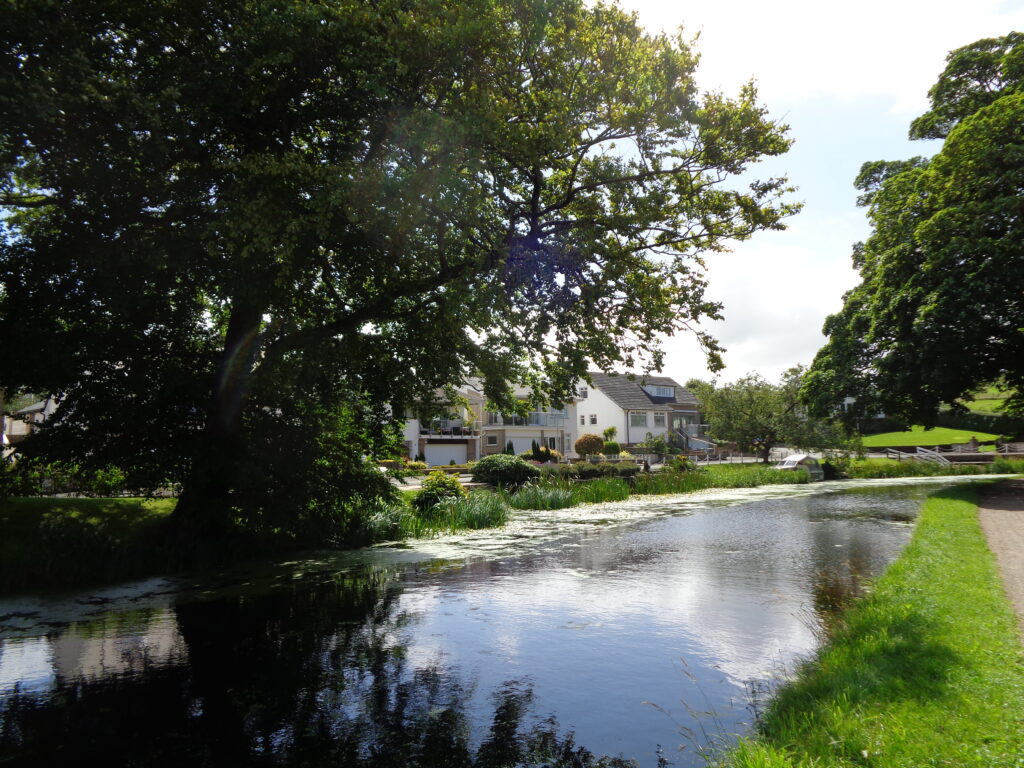
19th July 2020, Hest Bank
My misanthropy may be entirely justified – the question is, is it possible to maintain the cheerfulness?
© Lawrence Freiesleben,
Cumbria and Morecambe, February – April 2022
NOTES All notes accessed between Jan 19th and April 27th 2022
[i] WCML = West Coast Main Line . . . which seems to be the standard abbreviation for the route between London, Euston and Glasgow
[ii] Gross understatement – the human blindness sickens me to the point where it’s becoming impossible to care. We are doomed in a multitude of ways: climactic, technological, nuclear, sheer habitual greed and selfishness – to which almost everyone contributes at some level. Unfortunately, unless it can change drastically, human society does not deserve to continue.
[iii] https://en.wikipedia.org/wiki/Slyne-with-Hest
[iv] https://en.wikipedia.org/wiki/Hest_Bank_railway_station
[v] https://en.wikipedia.org/wiki/Bolton-le-Sands_railway_station
[vi] https://en.wikipedia.org/wiki/Camping_coach – just in case ‘glamping’ etcetera seemed like a new idea!
[vii] https://pjbrailwayphotos.piwigo.com/picture?/23349/category/223-hest_bank_old_photos_from_web
[viii] https://en.wikipedia.org/wiki/Hest_Bank_North_Junction
[ix] https://en.wikipedia.org/wiki/Water_trough
[x] https://www.francisfrith.com/hest-bank/maps
[xi] Severed in three places by the M6 and by the A590 near Kendal – though plans are afoot to restore these last 8 miles and put water back in the canal.
[xii] canalrivertrust.org.uk/enjoy-the-waterways/canal-and-river-network/lancaster-canal
Also: https://en.wikipedia.org/wiki/Lancaster_Canal
[xiii] Originally there were 8 locks in use from 1819 to 1942: see https://www.alamy.com/stock-photo/tewitfield-locks-lancaster-canal.html Also: https://en.wikipedia.org/wiki/Tewitfield
[xiv] Love from Room 109 by Tim Buckley: https://www.youtube.com/watch?v=fOeKz6JCKaw&ab_channel=PhilBebbington
[xv] From In Her Kingdom By the Sea Part 2 https://internationaltimes.it/in-her-kingdom-by-the-sea-part-2/ “This obsession (the intimation of there being something hidden behind) has never been whimsical or occurred by choice, and often feels almost supernatural – perhaps to decrease any sense of spiritual or metaphysical loneliness?”
[xvi] https://en.wikipedia.org/wiki/Forest_of_Bowland
[xvii] With the exception of the cut up Metaphysical Garden, Hawcoat estate, Barrow, 30th June 2021 in https://internationaltimes.it/the-evocation-of-the-inconsequential/
There is something more than sinister about this – as my eldest son first pointed out to me: that the company doesn’t seem to realise the symbolic implications of this virtual extermination!
[xix] From an email of April 2022 regarding the sculptural objects and other obstacles to snapshottery: “Morecambe is packed with all kinds of other clutter, including the “fish hook” in front of the old Alhambra and the “picture frame”. All these things are quite interesting and apart from Eric [Morecambe] who attracts endless photo calls, largely seem to go unnoticed – so I didn’t mean clutter entirely disparagingly. It’s just difficult to get a picture of the facade of, say, The Alhambra, without bins, lamp posts, signs, memorials, sculpture, drunks, dogs or shopping trolleys, all getting in the way – not to mention the endless stream of foul modern cars. The double decker buses and the L driver lorries (the training centre must be nearby) I don’t mind, they have some atmosphere, but modern cars make me almost physically sick! They look like over-inflated trainers (another hate) on wheels – or at their best (if I’m in a good mood) like walking boots . . .”
“In contradiction to my misanthropy above, over Bank Holiday weekend there was a happy seaside vibrancy – if you can remain detached (easier on a bike) and forget the ever-rapid decline of humanity (to be honest, I don’t think we ever had much chance, the natural instincts are all wrong – all the classic virtues have to be constantly relearned and practiced and few can keep it up and often the religious nuts are the most hypocritical of all).”
[xx] https://www.sabre-roads.org.uk/wiki/index.php?title=A5105
[xxi] See particularly part 2 of this digression: https://internationaltimes.it/in-her-kingdom-by-the-sea-part-2/
[xxii] https://en.wikipedia.org/wiki/Birthday_Letters
[xxiii] ISBN 13 9780571200856 subtitled: Ted Hughes, Sylvia Plath and the story of Birthday Letters
[xxiv] Error only appears available online via this rather twee site – the design of which perhaps undermines Error’s force: https://lovingsylvia.tumblr.com/post/501686672/pic-via-error-i-brought-you-to-devon-i
[xxv] There are many unforgettable poems before this in the sequence, The Gypsy, for instance, but they are not connected to North Devon.
[xxvi] One of only two third-person poems in the whole book “where the poet looks at himself all the way through” notes Erica Wagner on page 134 of Ariel’s Gift.
[xxvii] https://www.imdb.com/title/tt3319460/?ref_=nv_sr_srsg_2 This started intriguingly and was always well acted but declined into the usual dependence on violence and in this case vivid production design.
[xxviii] Which publishers and the media are bound to encourage, since it must all stimulate sales – yet also interest.
[xxix] “Light the touchpaper Putin – we’ve got nuffin to lose but our bones.”
“Where do all these looney leaders come from?”
“Search me dear.”
[xxx] From Birthday Letters, by Ted Hughes, p127: Daffodils
[xxxi] Little Witheridge from Ox-eye hill as we called it, back in 1998:
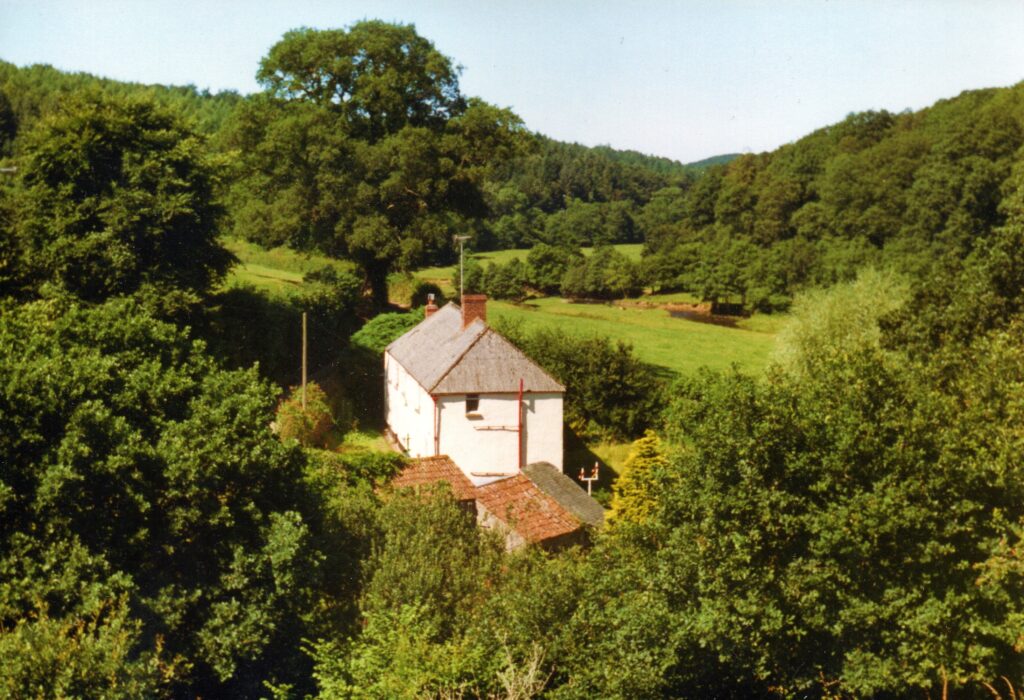
[xxxii] From Future Perfect (AKA To see our friendly kitchen again). Uncanny perhaps, considering the overlaps, that it was written before I encountered Hughes’ poems set in North Devon.
[xxxiii] Not that lovers of the work may notice this. As with the basically materialist world we’ve lived in for more than two thousand years, it’s rare for anyone to see outside it. It is our toxically unquestioned ground base. Add natural greed and the inevitable workings of the inadvertent society and what chance did we ever have? A philosophy of cheerful misanthropy may be the only way to survive?
[xxxiv] https://www.literaryladiesguide.com/literary-musings/sylvia-plaths-suicide-note-death-knell-cry-help/
[xxxv] I realise that brilliant actor Daniel Craig wasn’t cast as 007 until a little later but seeing him as Hughes this ludicrous connection is inevitable!
[xxxvi] Sylvia, 2003: https://www.imdb.com/title/tt0325055/?ref_=nm_flmg_act_37
[xxxvii] Though I’m not sure how much of a financial success it was – the initial figures on IMDb imply it lost money. Perhaps this analysis reveals the truth: https://www.the-numbers.com/movie/Sylvia#tab=summary I’m not sure, I can’t be bothered with mathematics.
[xxxviii] Presumably he didn’t feel so negative about North Tawton himself, returning to live in that same house until the end of his life over 30 years later. Or was this the effect of being so wrapped up in tragedy and myth that he felt he had no choice? No doubt I could investigate. Maybe someone reading this will know. But perhaps I prefer – like he might – to live in a less rational twilight.
[xxxix] The whole affair could appear to be purely random given that it was determined by looking in local newspapers to see which places available to rent in the UK were both remote and cheap enough. Noticeboards and magazines were the only other options in those days to search for a potential home, but for noticeboards you had to be in the area already. It’s true that the demand for cheap remote places was probably far lower in 1980 than it is now – who would want to be more than 5 miles from a town without a car, bus or train available? Since 1980 (up until 2011) the number of private vehicles owned has doubled (see; https://assets.publishing.service.gov.uk/government/uploads/system/uploads/attachment_data/file/8995/vehicles-summary.pdf) an increase of 100%. In approximately the same period (1980 to 2013) the population by contrast only increased by 13.8% (see: https://www.ons.gov.uk/peoplepopulationandcommunity/populationandmigration/migrationwithintheuk/articles/thechangingukpopulation/2015-01-15#:~:text=The%20UK%20population%20has%20grown%20by%207.8%20million%20since%201980&text=Since%201980%2C%20the%20UK%20population,the%20EU%20expansion%20in%202004
[xl]I actually lived in this remote caravan (small mobile home) with my first wife, but our lives were so separate, that I tend to remember it now as if I was alone. This is a shame as we did some good things together – including encountering some of the atmosphere of Error in village pubs where women were virtually unknown. Blank rooms falling totally silent and men staring at us as we crossed to a bar which appeared to be in someone’s living room. This instance, only just recalled, gives an extra reason for Error’s power – that my wife felt isolated, out on a limb, whereas I spent much of my time cycling and exploring, living therefore, if not exactly happily, then acceptingly in this foreign landscape. I feared yet liked the sense of exile. To reproduce this sense of exile now, I would have to move to Chile, Sri Lanka or some faraway country where London English was a peculiarity.
[xli] By the time I moved back to North Devon in 1995, most of the older generation I’d known around the Huntshaw area had died, and with increased accessibility, the general atmosphere had vastly altered even if remote houses such as Little Witheridge were still (thankfully) determinedly lodged in the past.
[xlii] A final assessment of The Weird Shadow over Morecambe is already made in the notes of part 2 of this digression https://internationaltimes.it/in-her-kingdom-by-the-sea-part-2/ Though I got close to almost skip-reading certain sections, I never actually did, so the book must have something . . . but as with Hughes’ poems involving North Tawton and Devon, the fact that I know the actual places undoubtably intensifies things.
[xliii] From Birthday Letters, by Ted Hughes, p122: Error.
[xliv] As Henry Williamson phrases it in Tarka the Otter – fortunately tourism has never gathered too much weight away from the coast.
[xlv] ISBN-13 : 978-0859676274 The Heart of the Country by Ravilious, James & Robin. Published by Scolar Press, London, 1980
[xlvi] Little Witheridge from a slightly different angle, back in 1998:
[xlvii] One of the key starting points of my novel Maze End (2013). The spirit of Little Witheridge also permeates Certainty Under the Rose (2018)
[xlviii] A spinoff phrase from my very short film review of Paulo Sorrentino’s The Great Beauty (Original title: La Grande Bellezza) 2013 15 2h 21m https://www.imdb.com/title/tt2358891/ This extravagant, overrated film skirts dangerously along the edge of sumptuous Heritage cinema, but does possess some notable points. Knock away about 45 minutes of the more worthless scenes and reduce the general gloss and it might become a good or even a great film. Rewatched, April 2022
[xlix] Echoing William Blake’s famous statement: “I must create a system or be enslaved by another man’s” see also: https://www.tate.org.uk/tate-etc/issue-11-autumn-2007/other-worlds
Loamy Cell, Gouache & Oil Pastel, 76.6 x 57.3 cm, 1990
[l] A phrase from Thomas Hardy’s I Found Her Out There: https://poets.org/poem/i-found-her-out-there
[li] From In Her Kingdom By the Sea Part 2 https://internationaltimes.it/in-her-kingdom-by-the-sea-part-2/: “So memorable is the atmosphere of certain days that they eclipse most others, and even if you can realise more (at the time) on your own, the joy is rarely present to the same degree. Back in ordinary human life, even that transcendental outreaching which occasionally flows from the solitary, tends to become abstract in retrospect.”

